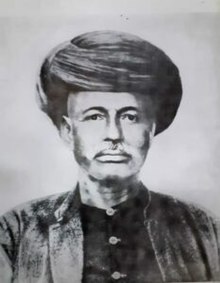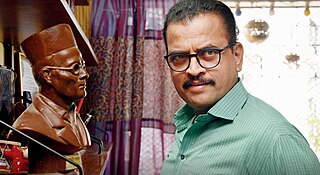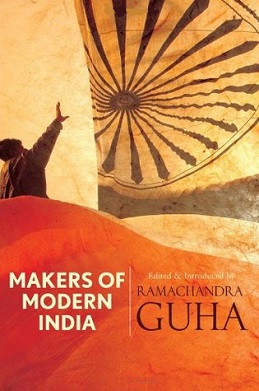





Contemporary groups, collectively termed Hindu reform movements, reform Hinduism, Neo-Hinduism, or Hindu revivalism, strive to introduce regeneration and reform to Hinduism, both in a religious or spiritual and in a societal sense. The movements started appearing during the Bengali Renaissance.
Bengali Brahmos are those who adhere to Brahmoism, the philosophy of Brahmo Samaj which was founded by Raja Rammohan Roy. A recent publication describes the disproportionate influence of Brahmos on India's development post-19th Century as unparalleled in recent times.

Ishwar Chandra Bandyopadhyay was an Indian educator and social reformer of the nineteenth century. His efforts to simplify and modernise Bengali prose were significant. He also rationalised and simplified the Bengali alphabet and type, which had remained unchanged since Charles Wilkins and Panchanan Karmakar had cut the first (wooden) Bengali type in 1780.

The Pashchimbanga Bangla Akademi is the official regulatory body of the Bengali language in West Bengal, India. It was founded on 20 May 1986 in Kolkata to act as the official authority of the language and is entrusted with the responsibility of reforming Bengali spelling and grammar, compiling dictionaries, encyclopedias and terminologies and promoting Bengali language and culture in West Bengal. Though the Akademi has no enforcement power over their rules and regulations, they are widely accepted by the Governments of West Bengal and Tripura as well as a considerable number of private publishing houses and institutions such as the Oxford University Press and the Ramakrishna Mission.

Nalini Ranjan Sarkar was an Indian businessman, industrialist, economist, and public leader. He was greatly involved in the political and economic regeneration of Bengal. Sarkar was Finance Minister of West Bengal in 1948. The Sarkar Committee Report was instrumental in the subsequent establishment of the four Indian Institutes of Technology (IITs) by the Government of India.

Ramabai Ranade was an Indian social worker and one of the first women's rights activists in the early 20th century. At the age of 11, she was married to Justice Mahadev Govind Ranade, who was a distinguished Indian scholar and social reformer.

This is a bibliography of notable works about the historical Indian subcontinent as well as the modern-day Republic of India.
Sare Jahan se Accha is a pencil sketch mural in Ahmednagar city in Maharashtra, India. It was created in the year 1997. The sketch was drawn by Pramod Kamble, who is a painter and sculptor. He created it as a tribute to the nation on the occasion of 50 years of independence. It was painted on the specially-prepared wall of Mahavir Art Gallery in Ahmednagar. Kamble has portrayed Bharat Mata and 500 great people born out of Indian culture. It is said to be the world's biggest pencil sketch. This is the only fixed asset in India which was made as a part of India's 50th Independence day celebration.

Netaji is a Bengali biographical soap opera on the life of Netaji Subhash Chandra Bose that premiered on 14 January 2019 and aired on Bengali GEC Zee Bangla. Based majorly on Udyata Kharga Subhash by Achintya Kumar Sengupta and produced by Surinder Films, the series stars Abhishek Bose in the eponymous role, with Basabdatta Chatterjee, marking her comeback on television, Dhruvajyoti Sarkar, Kaushik Chakraborty, Sriparna Roy, Debopriyo Sarkar, Sohan Bandopadhyay, Fahim Mirza appearing in other recurring roles. Due to the COVID-19 pandemic, the shooting of the series was stalled. It was rumoured that along with Karunamoyee Rani Rashmoni, this series will be axed the channel. Putting rest to such rumours, the shooting started from June 11 and new episodes started to air from June 15, 2020.

Sharad Ponkshe is an Indian actor and writer, mainly working in Hindi and Marathi cinema. He is a speaker and an actor in Marathi film, theater and television.

Makers of Modern India is a non-fiction book written by Indian historian-scholar Ramachandra Guha and published by Penguin India in 2010. The book features profiles of selected personalities that laid the foundation of modern India: Ram Mohan Roy, Syed Ahmad Khan, Khuda Bakhsh, Jotirao Phule, Gopal Krishna Gokhale, Bal Gangadhar Tilak, Tarabai Shinde, Mahatma Gandhi, Rabindranath Tagore, B. R. Ambedkar, Mohammad Ali Jinnah, Periyar, Kamala Devi Chattopadhyay, Jawaharlal Nehru, M. S. Golwalkar, Rammanohar Lohia, Jayaprakash Narayan, C. Rajagopalachari, Verrier Elwin, and Hamid Dalwai.